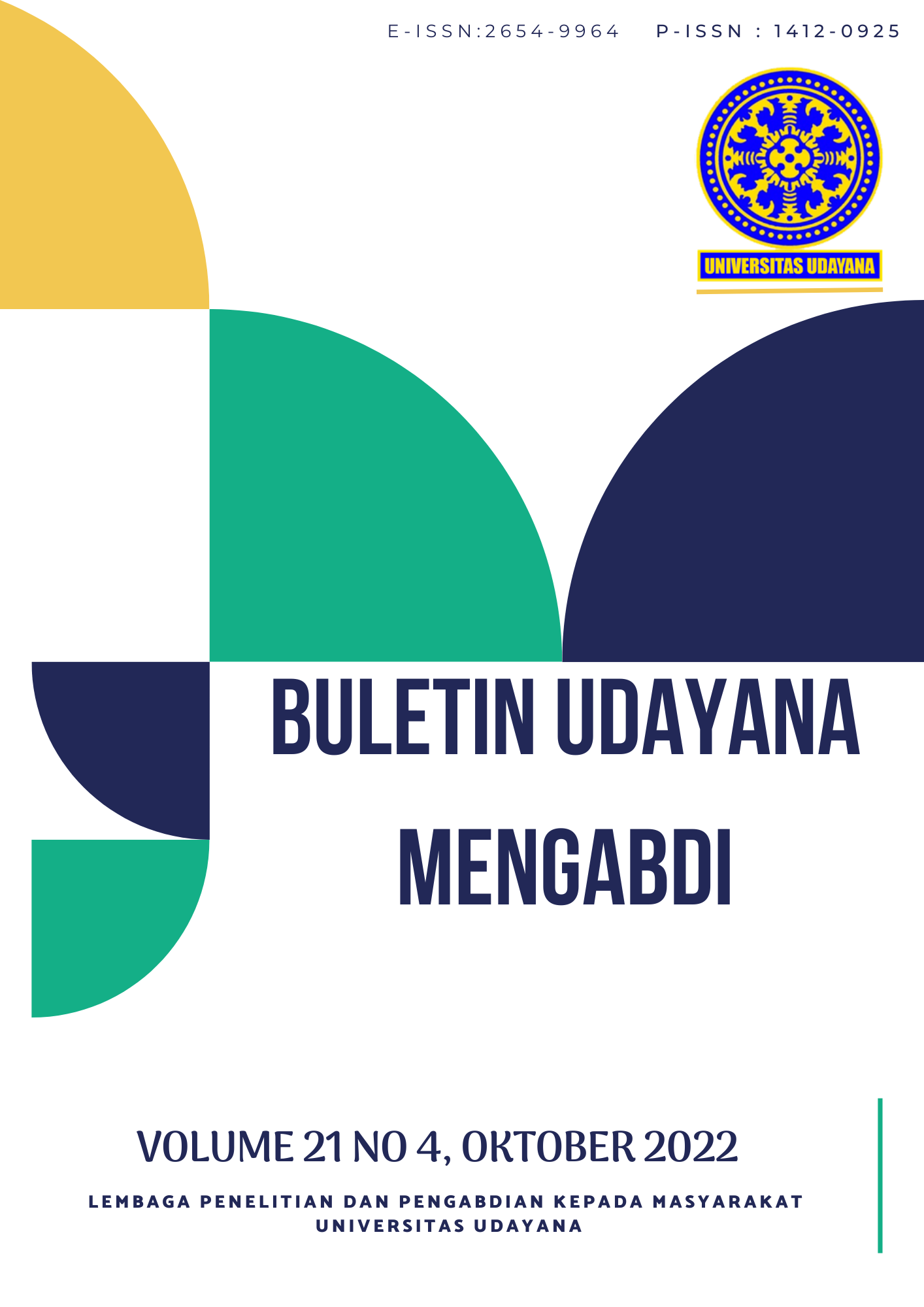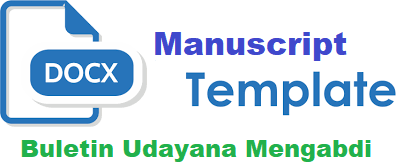GAMBARAN KADAR HEMOGLOBIN LANSIA DI DUSUN DEMULIH KECAMATAN SUSUT KABUPATEN BANGLI
Abstract
According to the Indonesian Ministry of Health in 2013, the rate of anemia in Indonesia was 46.3%, of which the highest prevalence was in the elderly group. The problem of anemia in the elderly is becoming very serious as the elderly population is increasing, anemia increases morbidity and mortality. Anemia in the elderly is caused by a lack of nutrients such as protein, iron, vitamin B12, folic acid, vitamin C as well as eating habits that inhibit nutrient absorption. Eighty elderly people participated in public service activities including measuring hemoglobin (Hb) levels, followed by providing multivitamins and iron supplements, and educating them on nutrient deficiency prevention. As a result, there were 27 elderly people with anemia (33.7%), 53 people (66.3%) with normal hemoglobin levels, and the rate of anemia in women (37.5%) was higher than in men. 28.1%). These data suggest a very high prevalence of anemia in the elderly, especially in older women.
Keywords: anemia, elderly, hemoglobin, iron, multivitamin,
Downloads
References
Alamsyah, P. R., and Andrias, D.R. (2019) Hubungan kecukupan zat gizi dan konsumsi makanan penghambat zat besi dengan kejadian anemia pada lansia. Media Gizi Indonesia, Vol 11:1, pp. 48-54
Bianchi, V.E. (2014). Anemia in The Elderly Population. J Hematol. Vol. 3:4. Pp.95-106
Das, S.N. et al. (2020). Oral versus intravenous iron therapy in iron deficiency anemia: An observational study. Journal of Family Medicine and Primary Care, Vol. 9:7, pp.3619-3622
Fukao, W. et al. (2018). Oral versus intravenous iron supplementation for the treatment of iron deficiency anemia in patients on maintenance hemodialysis-effecton fibroblast growth factor-23 metabolism. J Ren Nutr, Vol. 28:4, pp. 270-277
Kapoh, S.R. et al. (2021). Terapi Pemberian Besi pada Penderita Anemia Defisiensi Besi. e-CliniC, Vol.9:2, pp.311-317.
Kementrian Kesehatan R.I.2013. Hasil Riset Kesehatan Dasar (Riskesdas) 2013.
https://www.litbang.kemkes.go.id/laporan-riset-kesehatan-dasar-riskesdas/ diakses pada 6 Oktober
2021
Lanier, B. (2018) Anemia in Older Adults. Am Fam Physician, Vol. 98:7, pp. 437-442
Mehta, R. et al. (2017). Efficacy of iron-supplement bars to reduce anemia in urban Indian women: a cluster-randomized controlled trial. Adv Chronic Kidney Am J Clin Nutr, Vol.105:3, pp.746-757
Nakashima, A.T. et al.(2012). Anemia prevalence and its determinants in Brazilian institutionalized elderly. Nutrition, Vol. 28:5. pp. 640–643
Ozaydin, N. et al. (2013). Prevalence and risk factors of helico-bacter in Turkey: A nationally-representative, crosssectional, screnning with the 13C-Urea breath test.BMC Public Health, Vol.13:1215. pp. 1-12
Prasetya, H.R. et al. (2013). Gambaran Anemia pada Lanjut Usia di Panti Sosial Tresna Werdha Abiyoso Yogyakarta Tahun 2013. https://media.neliti.com/media/publications/338232-gambaran-anemia-pada-lanjut-usia-di-pant-628f6153.pdf diakses tanggal 6 Oktober 2021
Santos, I.S. et al. (2012). Anemia and Dementia Among The Elderly. The Sao Paulo Ageing and Health Study, Vol.24:1, pp.74-81
Tettamanti M, et al. (2010). Prevalence, incidence, and types of mild anemia in the elderly: the Health and Anemia popu¬lation-based study. Haematologica, Vol. 95:11. pp.1849-1856
Wreksoatmodjo, B.R. (2015). Aktivitas Kognitif Mempengaruhi Fungsi Kognitif Lanjut Usia di Jakarta. CDK, Vol.42:1. pp.7-13
Zahra, A.Z. et al. (2019). Karakteristik anemia pada lansia di RSUP Sanglah Denpasar pada bulan Januari-Juni 2017. Intisari Sains Medis, Vol. 10:2, pp.155-158

This work is licensed under a Creative Commons Attribution-ShareAlike 4.0 International License.

This work is licensed under a Creative Commons Attribution-ShareAlike 4.0 International License.




.png)


1.png) GARUDA - GARBA RUJUKAN DIGITAL
GARUDA - GARBA RUJUKAN DIGITAL



